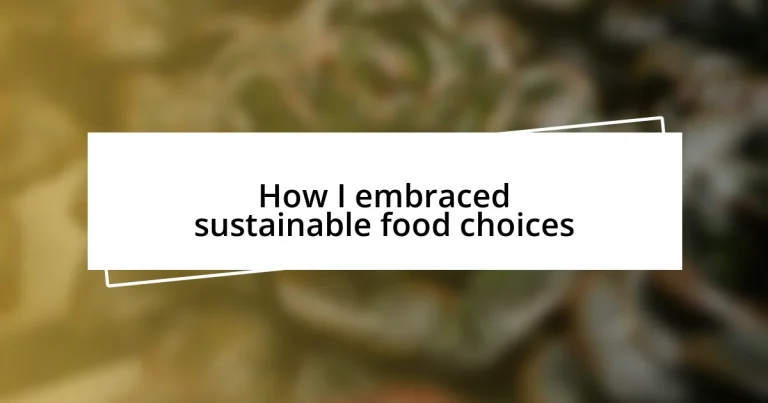Key takeaways:
- Sustainable food choices positively impact health, the environment, and local economies, emphasizing the importance of supporting local farmers and seasonal produce.
- Practical strategies for sustainable eating include meal planning, composting, and prioritizing bulk purchases to minimize waste and enhance nutrition.
- Overcoming challenges such as social situations and budgeting can be achieved by bringing your own dishes and leveraging local markets for affordable, sustainable options.
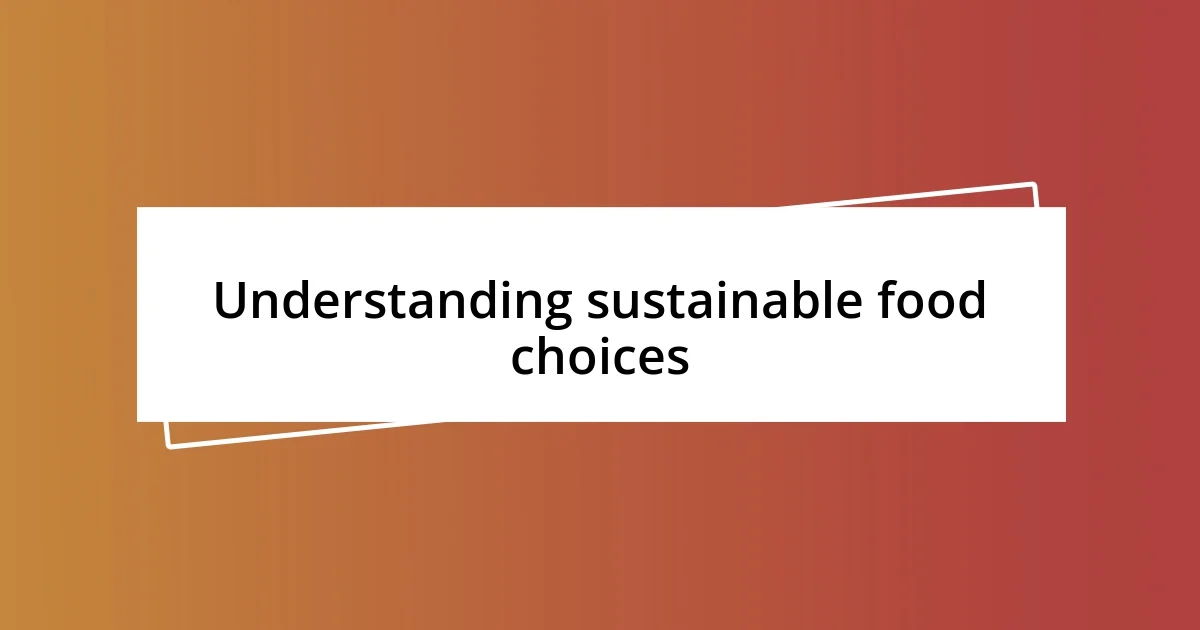
Understanding sustainable food choices
Sustainable food choices are about selecting products that have a positive impact on the environment, economy, and society. I remember my first trip to a local farmers’ market; the vibrant colors of the fresh produce and the stories behind each farm felt so empowering. Have you ever considered how the food on your plate can tell a story about sustainability? It truly changes your perspective.
I often reflect on how my food choices can affect not only my health but also the planet. Choosing organic or seasonal foods can feel like a small step, yet it contributes to biodiversity and reduces carbon footprints. It’s fascinating to think about how something as simple as my lunch could make waves in the local ecosystem.
When I learned about the concept of regenerative agriculture, it opened my eyes even further. This approach doesn’t just sustain the land; it actually improves it. What if we all made it a habit to ask where our food comes from? The next time you shop, consider the journey of your food—it might inspire you to make different choices that align with a more sustainable future.
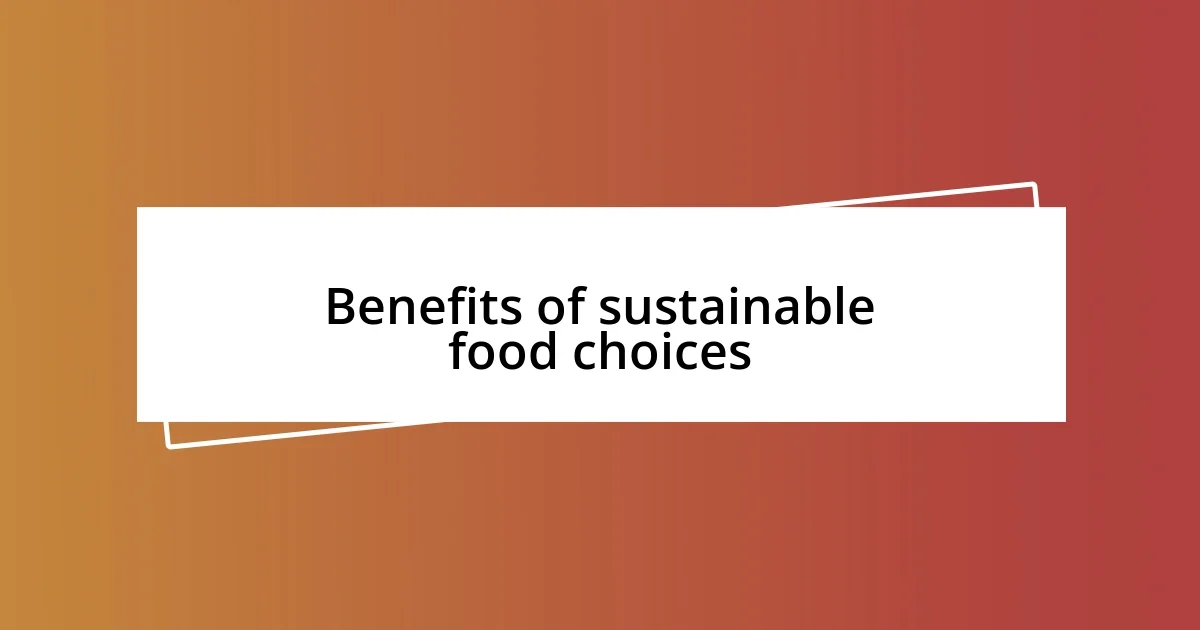
Benefits of sustainable food choices
Sustainable food choices offer numerous benefits that extend beyond just personal health. For instance, I vividly recall the sense of fulfillment I felt after discovering that by supporting local farmers, I was not merely buying food but also investing in my community. Each time I chose a local product, I could feel the direct impact on the economy, promoting small businesses and reducing the carbon footprint associated with long-distance transportation.
Moreover, I’ve noticed how embracing sustainable options has positively affected my overall wellbeing. When I shifted to eating more plant-based meals and organic produce, I experienced not only a boost in energy but also a renewed excitement for cooking. It’s incredible how nourishing foods can enhance not just physical health but also mental clarity and emotional satisfaction. Have you ever tried a fresh, seasonal dish that just made you feel alive?
Interestingly, the ecological benefits of sustainable choices resonate personally with me. I remember the first time I learned about the drastic impact of industrial farming on soil health. It struck a chord with me, knowing that my everyday decisions could either contribute to or help reverse this trend. By opting for sustainably sourced foods, I feel like I’m playing a part in a larger movement to protect our planet for future generations.
| Benefits of Sustainable Food Choices | Personal Insights |
|---|---|
| Supports Local Economies | Feeling fulfilled by investing in my community |
| Improves Health and Wellbeing | Renewed excitement for cooking with fresh ingredients |
| Protects the Environment | Taking part in a movement for sustainability |
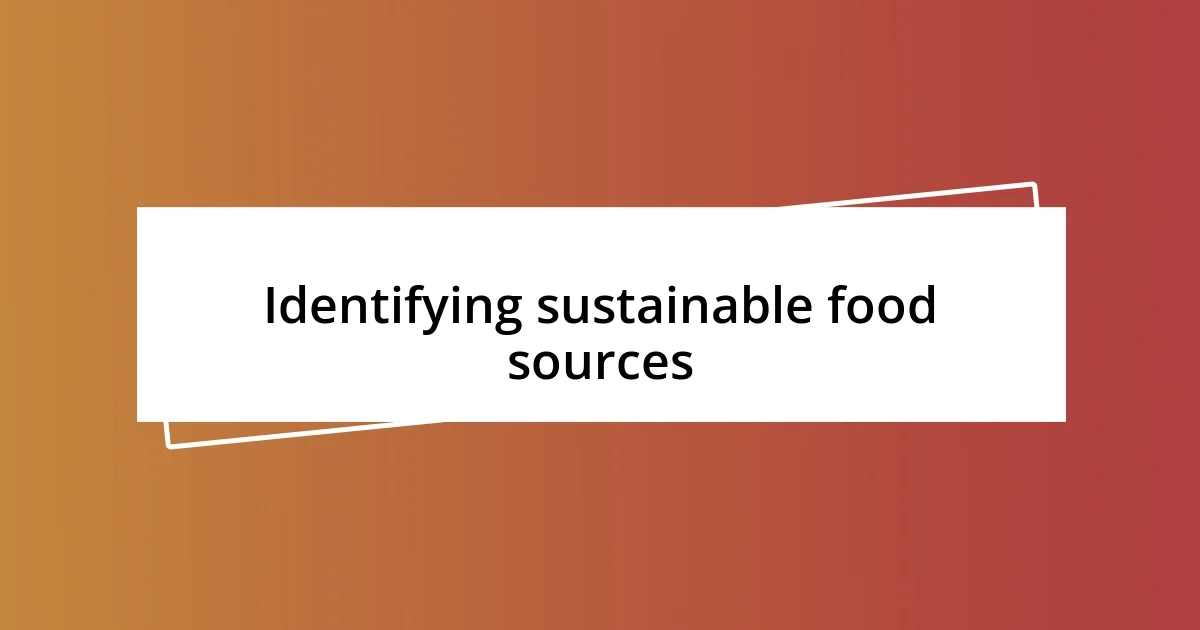
Identifying sustainable food sources
Identifying sustainable food sources can initially seem overwhelming, but I’ve found that a little research goes a long way. It’s not just about choosing organic labels; it’s often about getting to know the producers behind the products. I distinctly remember chatting with a local farmer at a community event. Hearing him talk about his practices and how he nurtures the soil made me realize just how impactful knowing my sources can be.
Here are some tips that have helped me in identifying sustainable food sources:
- Visit Local Farmers’ Markets: Engaging with vendors can provide insights into their farming practices.
- Research Food Labels: Look for certifications like USDA Organic, Fair Trade, or regenerative farming practices.
- Join Community Supported Agriculture (CSA): By opting for a CSA, you can directly support local farms and enjoy fresh, seasonal produce.
- Ask Questions: Don’t hesitate to inquire about where the food is sourced and how it’s grown; transparency is key!
- Explore Online Resources: Websites that promote local farms or guide sustainable shopping can be valuable tools.
Through this approach, I’ve cultivated a deeper connection to the food I consume. The journey of learning has not only impacted my meals but has also influenced how I perceive my role in supporting the environment.
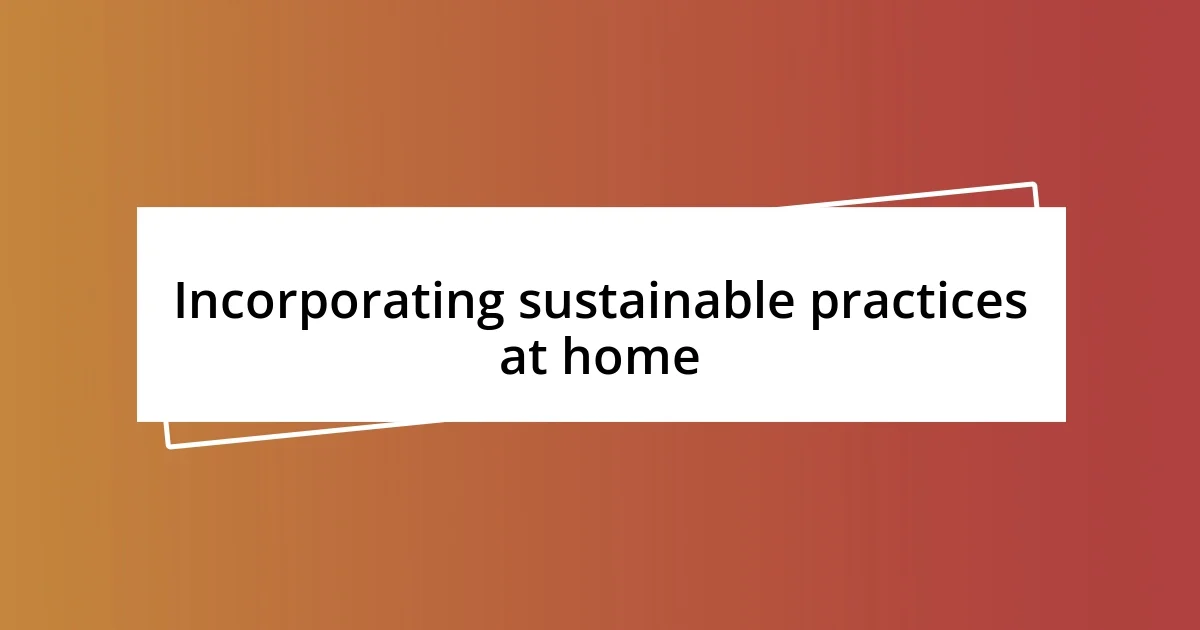
Incorporating sustainable practices at home
I’m always looking for ways to make my home more sustainable, and one of the simplest yet most effective practices I’ve adopted is meal planning. When I sit down each week to map out our meals, I not only reduce food waste, but I also find myself creatively using ingredients that are in season. For example, I remember a week when I had an abundance of kale, and instead of letting it go bad, I experimented with kale chips, smoothies, and even a hearty soup. This not only saved me money but also made me more conscious of what I’m consuming.
Another practice that has made a significant impact on sustainability in my home is composting. I was initially hesitant—after all, who wants to deal with food scraps? But when I started my small compost bin, I realized how easy it was to turn kitchen waste into nutrient-rich soil. I can’t describe the joy I felt when I first used my homemade compost in my garden; it felt like a small victory. It also sparked an interesting question: what if everyone committed to composting? Just think about the reduction in landfill waste!
I’ve also made it a point to create a zero-waste kitchen. This means using reusable containers instead of plastic wrap and finding creative ways to repurpose jars and bottles. One day, I turned an old glass jar into a cute herb planter. Every time I snip fresh herbs for cooking, it reminds me how small changes can lead to a big impact. Isn’t it satisfying to know that each little effort counts towards a greener planet?

Tips for mindful grocery shopping
When I step into a grocery store, I make it a point to shop with purpose. One of my first rules is to create a shopping list based on seasonal finds. I remember a grocery trip where I intentionally sought out local strawberries. Knowing they were picked from just a few miles away made them taste even sweeter! Don’t you find that connecting with your food enhances the experience?
I also pay close attention to the layout of the store. The perimeter usually showcases fresh produce, while the inner aisles can be a trap filled with processed options. I recall a moment when I found myself gravitating toward shiny packages, but I took a step back, reminding myself of my commitment to health and sustainability. It’s all about choosing nutrient-dense foods that support my body and the planet.
Whenever possible, I prioritize bulk bins. Not only do they cut down on packaging waste, but they also allow me to buy only what I need. I vividly remember filling a reusable bag with organic grains and nuts, feeling proud every time I avoided single-use plastic. Have you ever tried it? It’s like treasure hunting for healthy and sustainable options!
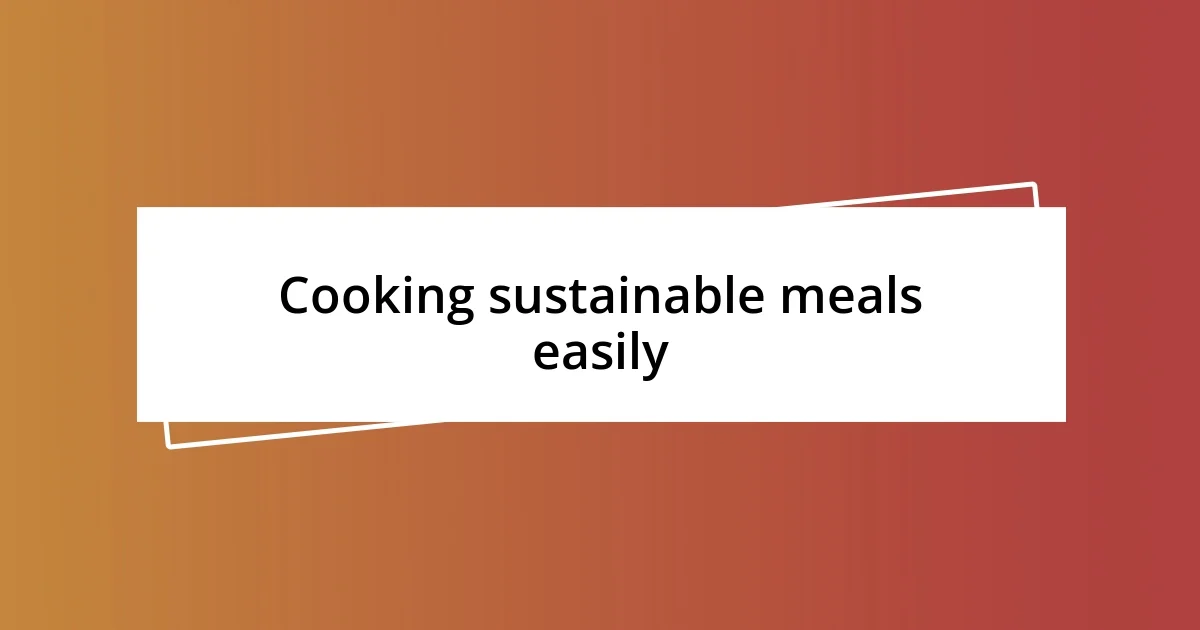
Cooking sustainable meals easily
Cooking sustainable meals doesn’t have to be a daunting task. One of the easiest ways I’ve embraced it is by keeping my pantry stocked with plant-based staples. The other day, I whipped up a delicious chickpea curry from ingredients I already had on hand. It felt rewarding to know that I didn’t need to rush to the store for fresh produce, yet I still created a comforting and hearty meal. Isn’t it amazing how versatile legumes can be?
Batch cooking has been another game changer for me. On Sundays, I dedicate a couple of hours to prepare large portions of different dishes. This not only saves time during the hectic week but also ensures I have ready-to-eat, sustainable meals at my fingertips. I remember the first time I made a big pot of lentil soup; it lasted for days, and each bowl felt like a nourishing hug in a time-saving container. Who doesn’t love a meal that warms the soul and makes life easier?
I also experiment with cooking techniques that minimize energy consumption, like one-pot meals or using the slow cooker. The other night, I made a veggie stew that simmered while I tackled other tasks around the house. The aroma filled my kitchen, and I couldn’t help but smile at how little effort it took for such a flavorful result. Have you ever noticed how simple cooking methods can turn into moments of joy? It’s all about finding little efficiencies that celebrate sustainable cooking!
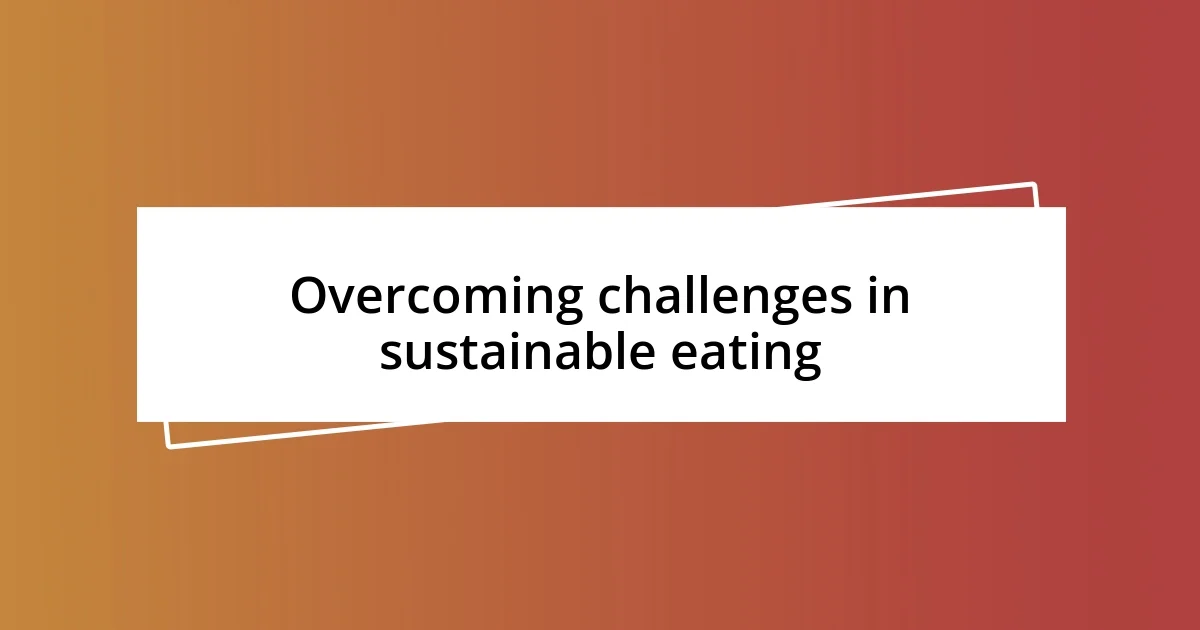
Overcoming challenges in sustainable eating
Sustainable eating can feel overwhelming, especially when social gatherings or busy schedules disrupt your intentions. I’ll never forget the time I attended a family barbecue, where the options were mostly conventional fare. Instead of feeling left out, I brought a vibrant quinoa salad. Watching everyone relish my dish was a delightful surprise, and it showed me that making sustainable choices can inspire others, too. Have you ever turned a potentially challenging situation into an opportunity for connection?
Another hurdle I faced was budgeting. At first, I thought that eating sustainably would break the bank. However, I began to find creative ways around this. I started visiting farmers’ markets, where I could often score fresh produce at lower prices, especially if I chatted with the vendors. It’s incredible how building relationships can lead to better deals. Have you ever had a conversation that changed your perspective on where to shop for food?
Lastly, I learned how to deal with the temptation of convenience foods. Initially, ready-made meals were my go-to on busy days, but I realized they often lacked nutritional value. I decided to experiment with freezer-friendly meals instead, preparing extra portions and storing them for later. The moment I unwrapped a homemade, nutritious meal felt like coming home after a long day. Don’t you think there’s something deeply satisfying about enjoying your own creations? It’s these little victories that keep me motivated on my sustainable eating journey.












